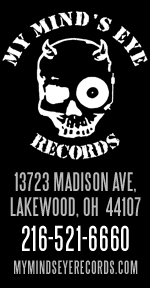
On my weekly trek to Tastebuds, a wonderful Cleveland lunch spot, past the north end of the Cleveland State campus and across from the second district police station, stands a piece of Cleveland rock and roll history. At Payne and East 22 is the Film Building, which once housed The Right Track studio.
Working in the mid-80s as a janitor and handyman at Right Track, Trent Reznor received discounted off-hours recording time from own Bart Koster. Reznor used to the time to record the demos and final tracks for what would become the Nine Inch Nails 1989 debut CD, Pretty Hate Machine. Last year Pretty Hate Machine was remastered , and its vinyl version has been consistently a top ten seller for EDGE/AEC Distributing catalogue.
As I have written previously, the vinyl spreads out all the accoutrement sounds in the PHM mix, giving the re-mastered version even a more grandiose, over-the-top aura than even before. Simply, PHM sounds great on vinyl. This is ironic: PHM was originally released at a time when the music industry was de-emphasizing vinyl in order to re-reap profits on back catalogue compact disc.
I remember, back in 1988, listening to the original demos. The cassettes were passed around by Reznor’s friend and manager John Malm to music types in the Cleveland area; the the project was titled Crown of Thorns, not Nine Inch Nails. I was immediately impressed on the catchiness of the songwriting and the sophistication of the production. It did not have the machine-like, tinny aggressiveness of the final PHM product; in retrospect, Reznor had not yet embraced the industrial Wax Trax influences into his sound. It reminded me more of the arty, modern rock of the time—Peter Gabriel, Kate Bush, Laurie Anderson, etc.
Which was to be expected. Before forming NIN, Reznor was in a later configuration of a popular local “modern rock” act, The Exotic Birds, and in Slam Bam Boo, which strove for a Depeche Mode/Duran Duran sound. For the demos for PHM, Reznor drew on the pop formulas of these sources for an accessible sound.
After all the major labels turned down Crown of Thorns, Malm found Reznor a contract with TVT Records, Steve Gottlieb’s label that made millions selling collections of classic television theme songs.
After Reznor hit it big with Pretty Hate Machine, The Right Track’s stock went up and many acts flocked to record there. In 1991 Cleveland’s acclaimed glam punkers Death of Samantha recorded what would be their last, unreleased, album at Right Track. For a few days I observed the recording, which was engineered and produced by Reznor associate Sean Beavin. The Right Track looked like pretty much any other mid-priced recording studio—worn and messy. Second hand furniture, amp crates, incongruous pieces of percussion, fast food cartons and tattered old girlie magazines–all were strewn over some sickly-colored carpeting. (For some other reaon I also remember picking up a book of essay by some Canadian author who critized E.B. White’s Elements of Style.)
Death of Samantha’s front man, John Petkovic, remembers even less of the Right Track. “It’s all a blur,” recalled Petkovic, who since then has recorded and toured with Cobre Verde and with J. Macsis in Sweetapple. “I was really unimpressed with the technology. We were recording on two inch tapes, which even at the time were outdated. There wasn’t anything really distinct about the place I can recall.”
While The Right Track began the Nine Inch Nails—Cleveland, a few miles to the South in the Tremont, Lemco Hall is where the relationship ended. A former Slavic community center, Lemco Hall is renown as the setting for the wedding scene in the movie The Deer Hunter. In the 1980s it was renovated and converted into condos and office space.
In 1999, Reznor and NIN manager John Malm formed Nothing Records and operated it out of Lemco. While the label had mostly smaller acts, it hit big time with Marilyn Manson’s early releases. Most of the management and marketing operations were conducted from this location.
Like most with Reznor relationships, this one ended badly. By the end of the 90s Nothing had moved out of Lemco, and Reznor was moving out of a decade-long drunken/drugged stupor. In 2004 Reznor, who had since moved from Cleveland to New Orleans, successfully countersued Malm for fraud and breach of fiduciary duty. Reznor was awarded five million dollars in damages.
Apparently, Reznor continues his spite for Malm to this date. In the liner notes of remastered PHM Reznor does not even acknowledge Malm—a pretty petty attitude towards someone who supported Reznor in some lean, unpromising times. (But maybe Malm should be thankful—Reznor gave a shoutout of “fuck you. steve gottlieb tvt” to the person who signed him when no one else would).
Reznor, does, though, thank Bart Koster, his old Right Track boss. As should all NIN fans for giving Reznor a recording opportunity.






